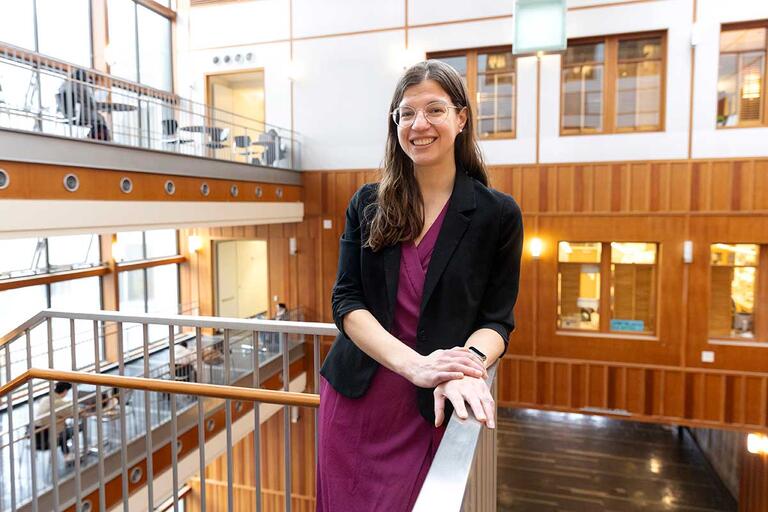Research Corporation for Science Advancement, theHeising-Simons Foundation, the Kavli Foundation and NASA announce awards totaling more than $1 million to eight interdisciplinary teams in the final year of Scialog: Signatures of Life in the Universe, an initiative launched in 2021 to catalyze fundamental science in the search for life beyond Earth.
The 21 individual awards of $50,000 in direct costs will go to 19 researchers from a variety of institutions in the United States and Canada.
“Magic happens when people with different backgrounds, methodologies, and vocabularies work together,” said RCSA President & CEO Daniel Linzer. “With decades of science in front of them, early career scientists at Scialog build new networks of people to bounce ideas off of and open up new avenues of research to make that as rich an experience as possible.”
Including the 2023 awards, RCSA and its funding partners have awarded a total of more than $3.3 million through the three-year Scialog: Signatures of Life in the Universe initiative.
Scialog is short for “science + dialog.” Created in 2010 by RCSA, the Scialog format supports research by stimulating intensive interdisciplinary conversation and community building around a globally important scientific theme. Teams of two or three Fellows who have not previously collaborated compete for seed funding for novel research projects based on the ideas that emerge at the conference.
The final meeting of Signatures of Life in the Universe was held March 16-19, 2023, in Tucson, Arizona. A third of the 50 Fellows in attendance, from disciplines across physics, astronomy, geology, planetary science, chemistry, biology, and biochemistry, were first-time participants. Included in the group were six alumni from Heising-Simons' 51 Pegasi b postdoctoral fellowship program who recently transitioned to faculty positions.
Keynote speaker Lisa Kaltenegger, Director of the Carl Sagan Institute at Cornell University, kicked off discussions with her talk, “Other Earth(s) – and Earth seen as an Alien Planet.” She said Earth’s changes through time and the diversity of its biosphere provide keys to humankind’s ongoing adventure to search for other life in the cosmos.
“If we’re spending so much time looking for life, let’s change the vantage point,” she said. “Who could be looking for us with the same technology? Some of the exoplanet systems that we know of have seen us already, or would have seen us if they were looking. And some of them will have hundreds of years before they have the vantage point where they can see Earth.”
She said engineers, theorists, experimentalists, and observers alike need to think “wide-open thoughts” and share their expertise to create the toolkit needed to find life among the amazing diversity of worlds we have already detected.
Two days of lively breakout sessions followed, led by Kaltenegger and other Facilitators including: Daniel Apai, University of Arizona; Jonathan Fortney, University of California, Santa Cruz; Tori Hoehler, NASA Ames; Tim Lyons, University of California, Riverside; Niki Parenteau, NASA Ames; and Beth Willman, LSST Corporation.
In fast-paced discussions that Apai described as "bursting with ideas,” participants coalesced into teams around emerging ideas for projects they might tackle together. They pitched their proposals on the final day of the meeting.
These teams will receive 2023 Scialog Collaborative Innovation Awards:
Morgan Cable, Planetary Science Section, NASA Jet Propulsion Laboratory / California Institute of Technology 4
Nagissa Mahmoudi, Earth & Planetary Sciences, McGill University 1
The Power is in the Poop: Experimental Investigation of Microbially-Generated Organics as a Biosignature for Ocean Worlds
Jennifer Bergner, Chemistry, University of California, Berkeley 1
Christopher Glein, Space Science Division, Southwest Research Institute 1
Renyu Hu, Astrophysics & Space Sciences, Jet Propulsion Laboratory 4
A Close Look at the Habitability of Water Worlds
Marc Neveu, Astronomy / Planetary Environments Laboratory, University Maryland/NASA Goddard Space Flight Center 4
Malena Rice, Astronomy, Yale University 1
Leslie Rogers, Astronomy & Astrophysics, University of Chicago 1
Investigating the Biological Potential of Moons in the Uranus System
Peter Gao, Earth and Planets Laboratory, Carnegie Institution for Science 1
Renyu Hu, Astrophysics & Space Sciences, Jet Propulsion Laboratory 4
Chenguang Sun, Geological Sciences, University of Texas at Austin 1
Constraining Volatile Budgets in Small Exoplanets through Coupled Petrological and Atmospheric Modeling and Observations
Greg Fournier, EAPS, Massachusetts Institute of Technology 1
Morgan Raven, Earth Science, University of California, Santa Barbara 2
Sulfur Assimilation: A Novel Proxy for Redox Transitions in the Early Biosphere
Bradford Foley, Geosciences, Pennsylvania State University 2
Sukrit Ranjan, Planetary Sciences, University of Arizona 3
Rebecca Rapf, Chemistry, Trinity University 3
Morgan Raven, Earth Science, University of California, Santa Barbara 2
Constraining the Abiotic Sulfur Cycle on Temperate Terrestrial Planets
Tyler Robinson, Lunar and Planetary Laboratory, University of Arizona 2
Amanda Stockton, Chemistry and Biochemistry, Georgia Institute of Technology 2
Irradiated Sea Spray Aerosol Generation and Analysis Under Early Earth Atmospheres
Paul Bracher, Chemistry, Saint Louis University 1
Christopher Hamilton, Lunar and Planetary Laboratory, University of Arizona 1
Rocky Roads: Flow Pathways and Chemical Evolution in Vesicular Lava and Pumice
1 Funded by Heising-Simons Foundation
2 Funded by RCSA
3 Funded by Kavli Foundation
4 Funded by NASA
RCSA is hosting six Scialog conferences in 2023: Signatures of Life in the Universe in March, Microbiome, Neurobiology and Disease in April, Advancing BioImaging in May, Mitigating Zoonotic Threats in September, Molecular Basis of Cognition in October, and Negative Emissions Science in November.
Two new Scialog initiatives have been announced to launch in 2024: Automating Chemical Laboratories and Early Science with the LSST

